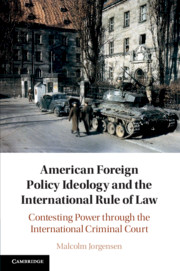 American Foreign Policy Ideology and the International Rule of Law
American Foreign Policy Ideology and the International Rule of Law from Part I - Ideology in American International Law Policy
Published online by Cambridge University Press: 12 December 2019
Chapter 1 of Part I assesses the extent to which scholars and analysts of IL provide compelling explanations for distinctive American IL policy. An increasing number of analyses have drawn on the pedigree of a long-established literature on ‘American exceptionalism’. As a term of art in political science, American exceptionalism refers to the idea that history and values set the country qualitatively apart from other nations, which is the meaning followed in this book as the most historically grounded and analytically useful. In contrast, increasing use in legal scholarship has more often narrowed the concept to pejorative shorthand for the American practice of seeking ‘exceptions’ to global legal rules, and therefore as uniformly detracting from the international rule of law. This chapter unpacks these accounts by focusing on three common explanations for idiosyncratic policy: the expected rational behaviour of a state with uniquely preponderant global power; distinctive American jurisprudence; and unique political culture forged in the nation’s historical experiences. Read together, these three explanations exhibit striking correlation, indicating the need for a fresh account that maps deep-seated connections between the ideas and interests shaping IL policy.
To save this book to your Kindle, first ensure [email protected] is added to your Approved Personal Document E-mail List under your Personal Document Settings on the Manage Your Content and Devices page of your Amazon account. Then enter the ‘name’ part of your Kindle email address below. Find out more about saving to your Kindle.
Note you can select to save to either the @free.kindle.com or @kindle.com variations. ‘@free.kindle.com’ emails are free but can only be saved to your device when it is connected to wi-fi. ‘@kindle.com’ emails can be delivered even when you are not connected to wi-fi, but note that service fees apply.
Find out more about the Kindle Personal Document Service.
To save content items to your account, please confirm that you agree to abide by our usage policies. If this is the first time you use this feature, you will be asked to authorise Cambridge Core to connect with your account. Find out more about saving content to Dropbox.
To save content items to your account, please confirm that you agree to abide by our usage policies. If this is the first time you use this feature, you will be asked to authorise Cambridge Core to connect with your account. Find out more about saving content to Google Drive.